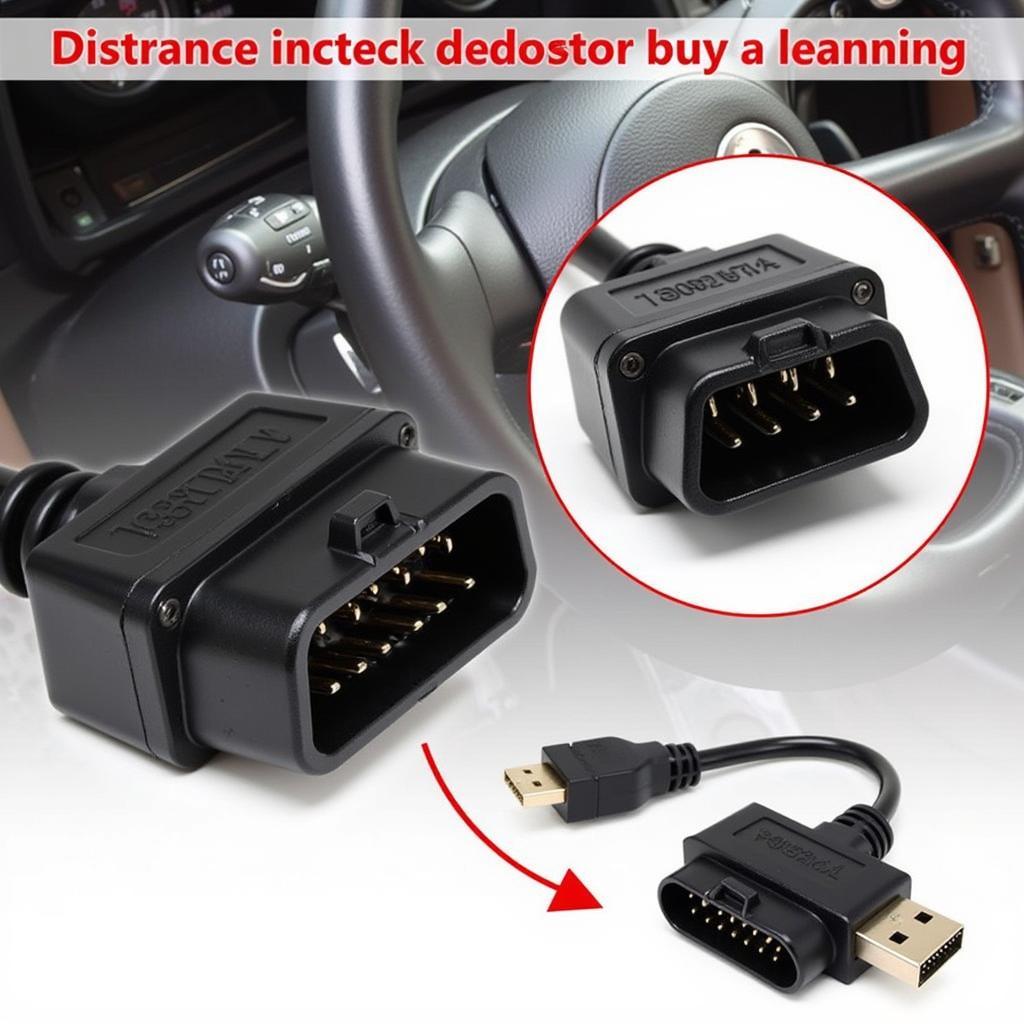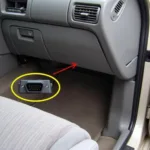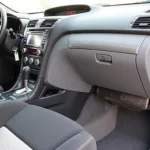Connecting your OBD2 scanner to your vehicle should be simple, but what happens when your car has a 7-pin or 9-pin diagnostic port instead of the standard 16-pin OBD2 connector? That’s where OBD2 adapters come in. These handy tools bridge the gap, allowing you to use modern OBD2 scanners with older vehicles.
This guide delves into the world of OBD2 adapters for 7-pin and 9-pin connectors, explaining everything you need to know about compatibility, functionality, and choosing the right adapter for your needs.
Why Use OBD2 Adapters for 7-Pin and 9-Pin Connectors?
Before OBD2 became the standard in 1996, car manufacturers used various diagnostic connectors, including 7-pin and 9-pin configurations. This can be a headache if you want to use a modern OBD2 scanner on an older vehicle.
OBD2 adapters offer a solution by converting the signals from your car’s 7-pin or 9-pin port to the standard 16-pin OBD2 interface. This allows you to access vital diagnostic information, read and clear fault codes, and monitor engine performance, even on vehicles manufactured before OBD2 became mandatory.
Understanding 7-Pin and 9-Pin Diagnostic Ports
While OBD2 standardized vehicle diagnostics, older cars relied on manufacturer-specific protocols and connectors. 7-pin and 9-pin ports were common, each serving specific diagnostic functions.
For instance, some manufacturers used a 7-pin connector for engine management diagnostics and a separate 9-pin connector for ABS or airbag systems. Identifying your vehicle’s specific connector configuration is crucial for choosing the correct adapter.
Choosing the Right OBD2 Adapter
Selecting the right OBD2 adapter involves considering several factors:
- Vehicle Make and Model: Different manufacturers used different pin configurations and communication protocols. Ensure the adapter explicitly states compatibility with your car’s make, model, and year.
- Diagnostic Port Type: Identify whether your vehicle uses a 7-pin or 9-pin connector. Some vehicles might even have both for different systems.
- OBD2 Scanner Compatibility: Verify that the adapter is compatible with your specific OBD2 scanner.
- Functionality: Some adapters only support basic code reading and clearing, while others offer advanced functions like live data streaming, component activation, and ECU programming.
“It’s crucial to invest in a high-quality OBD2 adapter from a reputable brand,” advises John Miller, Senior Automotive Diagnostic Technician at Car Tech Solutions. “A reliable adapter ensures accurate data transmission and prevents potential damage to your vehicle’s electronics.”
Using an OBD2 Adapter: A Step-by-Step Guide
- Identify the diagnostic port: Locate the 7-pin or 9-pin diagnostic port on your vehicle. Consult your owner’s manual if you’re unsure.
- Connect the adapter: Plug the adapter securely into the vehicle’s diagnostic port.
- Connect the OBD2 scanner: Connect your OBD2 scanner to the adapter’s 16-pin connector.
- Turn on the ignition: Turn the ignition key to the “on” position without starting the engine.
- Establish communication: Power on your OBD2 scanner and allow it to establish communication with the vehicle’s ECU.
Once connected, you can use your OBD2 scanner to access diagnostic information just like you would with a vehicle equipped with a standard 16-pin OBD2 port.
Benefits of Using OBD2 Adapters
- Cost-effective Solution: Adapters are a budget-friendly alternative to purchasing separate diagnostic tools for different vehicle connector types.
- Expanded Compatibility: Enables the use of modern OBD2 scanners with older vehicles.
- Enhanced Diagnostics: Access a wider range of diagnostic information, even on vehicles with limited OBD2 functionality.
- DIY Repairs: Allows car enthusiasts and DIYers to perform basic diagnostics and repairs on older vehicles.
Common Uses of OBD2 Adapters
OBD2 adapters for 7-pin and 9-pin connectors have various applications, including:
- Reading and Clearing Fault Codes: Diagnose engine issues, ABS problems, airbag faults, and other system malfunctions by retrieving and clearing diagnostic trouble codes.
- Monitoring Engine Performance: Access live data streams for parameters like engine RPM, coolant temperature, oxygen sensor readings, and throttle position.
- Component Activation: Perform tests on components like fuel injectors, solenoids, and relays.
- ECU Programming: Some advanced adapters allow for ECU flashing and reprogramming.
Conclusion
OBD2 adapters for 7-pin and 9-pin connectors are essential tools for anyone working on older vehicles. They bridge the gap between legacy diagnostic systems and modern OBD2 scanners, enabling comprehensive diagnostics and troubleshooting.
By understanding the different adapter types, compatibility factors, and functionality, you can confidently choose the right adapter for your needs. This allows you to unlock the full potential of your OBD2 scanner and gain deeper insights into your vehicle’s health, even if it predates the OBD2 standard.
Frequently Asked Questions (FAQs)
Can I use any OBD2 adapter with my vehicle?
No, compatibility depends on your vehicle’s make, model, year, and diagnostic port type. Always verify compatibility before purchasing an adapter.
Are OBD2 adapters safe to use?
Yes, reputable brands manufacture adapters to industry standards, ensuring safe and reliable operation. However, using a low-quality or incompatible adapter can potentially damage your vehicle’s electronics.
What can I do if my OBD2 scanner doesn’t communicate after connecting the adapter?
Double-check the connections, ensure the ignition is turned on, and verify that the adapter and scanner are compatible with your vehicle.
Can I leave the adapter connected permanently?
While it’s generally safe to leave the adapter connected, it’s recommended to disconnect it when not in use to prevent any accidental damage or battery drain.
Where can I find reliable OBD2 adapters?
Reputable online retailers and auto parts stores offer a wide selection of OBD2 adapters.
Need help with choosing the right OBD2 adapter or have other car diagnostic questions? Contact our team of experts through WhatsApp: +1(641)206-8880 or email us at [email protected]. We’re available 24/7 to assist you!


